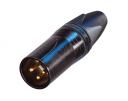Many years ago when I worked in the Technical Services Dept. at Duke University, we embraced a speaker cable connector standard that seems to have fallen by the wayside. We used the standard XLR3 connector for speaker cables-the same connector that was used on microphone cables.
With my background in pro sound, I was familiar with both the quarter inch standard ![]() , and the Canon EP
, and the Canon EP ![]() multipin standard. I had never seen the XLR used for speaker cables. I quickly became a convert. Here’s why.
multipin standard. I had never seen the XLR used for speaker cables. I quickly became a convert. Here’s why.
Because speaker cables with XLR connectors have a male connector on one end and a female on the other, its easy to extend the length of a cable without an adapter. Not using an adapter means not losing an adapter. This is a really valuable feature when doing long outdoor speaker cable runs.
Each pin in an XLR3 connector is rated at 15 amps. That’s more than enough current carrying capacity for most practical amplifier outputs.
The flexible strain relief boot on an XLR connector is flexible enough to handle 2 conductor 14 gauge, or even 12 gauge cable.
Each pin makes independent contact with the mating connector, unlike a quarter inch connector where the tip must make contact with the sleeve before it mates with the tip.
Finally the solid, easy to use locking mechanism on the XLR3 means that no additional securing of a connection is necessary when cables are linked together.
A couple of amplifier manufacturers adopted this standard back in the 1980’s, but they let it fall by the wayside when the industry as a whole failed to sign up.
On more than one occasion, I must admit that I used a microphone cable as a temporary speaker cable when I ran out of speaker cables. Try that with a Speakon cable!
GoodBuyGuys.com is your online source for Shurtape gaffers tape, Duracell Procell batteries, MagLite flashlights, Nashua duct tape, Bay State wire ties, Electratrac and Coast Wire extension cords , OnStage Stand mic stands and quality speaker cables.


Leave a Reply
You must be logged in to post a comment.